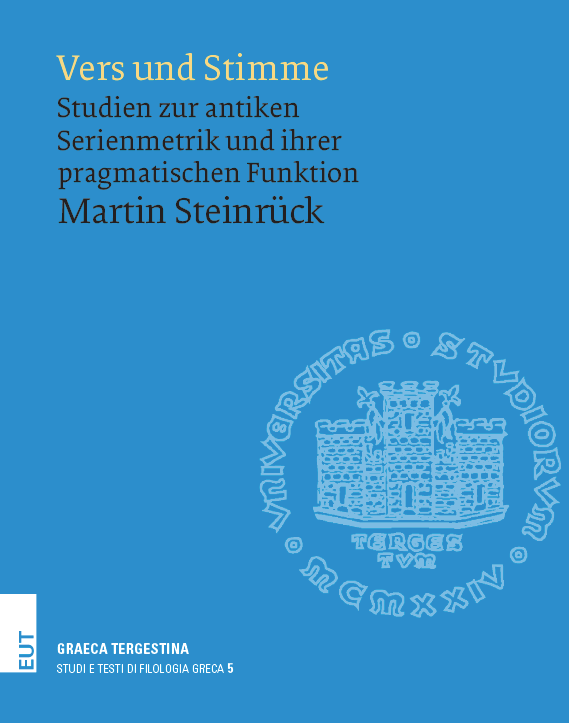Vers und Stimme. Studien zur antiken Serienmetrik und ihrer pragmatischen Funktion
Steinru¨ck, Martin
| Editore: EUT Edizioni Università di Trieste | Collana: Graeca Tergestina. Studi e testi di filologia greca |
| pp. 165 | ISBN: 978-88-8303-716-0 |
| ed. 2016 | eISBN: 978-88-8303-717-7 |
| Formati: Stampa, eBook |
|
| Prezzo: € 14.00 |
In ancient Greek epic tradition we can see strange rhythmic clusters,
consisting of blocks of 4-5 verses that share a long syllable at the same
position (although the epic verse usually tends to variation). Some of these
series interact with the same speech-type, others seem to participate in the
construction of repetition-figures. The older the text, the more frequent these
clusters are, occurring less in narrative and more in catalogues.
How are we to interpret the fact that almost all epic oaths are linked to such
clusters, except some of them that are actually lies? The first solution would be
expressiveness, but counterproofs with the discourse of prayer or threatening
speeches are less conclusive. This book offers another, rather pragmatic,
solution for explaining the phenomenon of rhythmic clusters in Greek epic:
oath, prayer, order, but also irony have in common that the locuteur/narrator
I/ poet’s voice is speaking behind narrator II or the characters. Singing an epic
song is a stressful multitasking job where the metrical engine and telling the
story have to be well in tune. When the voice of locuteur is added to all this,
the singer seems to put the metrics on auto-pilot and starts to use metrical
clusters, in order to manage both to continue the narration and to address the
audience from behind his narrator’s mask.
Catalogo
- Ingegneria civile ed Architettura
- Ingegneria industriale e dell'informazione
- Religioni e Teologia
- Scienze agrarie e veterinarie
- Scienze biologiche
- Scienze chimiche
- Scienze della Terra
- Scienze dell'antichità, filologico-letterarie e storico-artistiche
- Scienze economiche e statistiche
- Scienze fisiche
- Scienze giuridiche
- Scienze matematiche e informatiche
- Scienze mediche
- Scienze politiche e sociali
- Scienze storiche, filosofiche, pedagogiche e psicologiche

